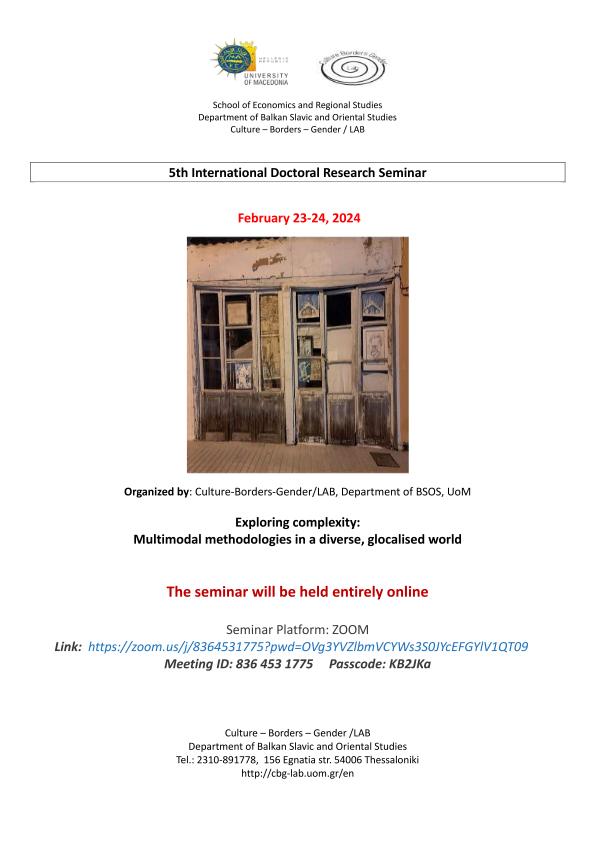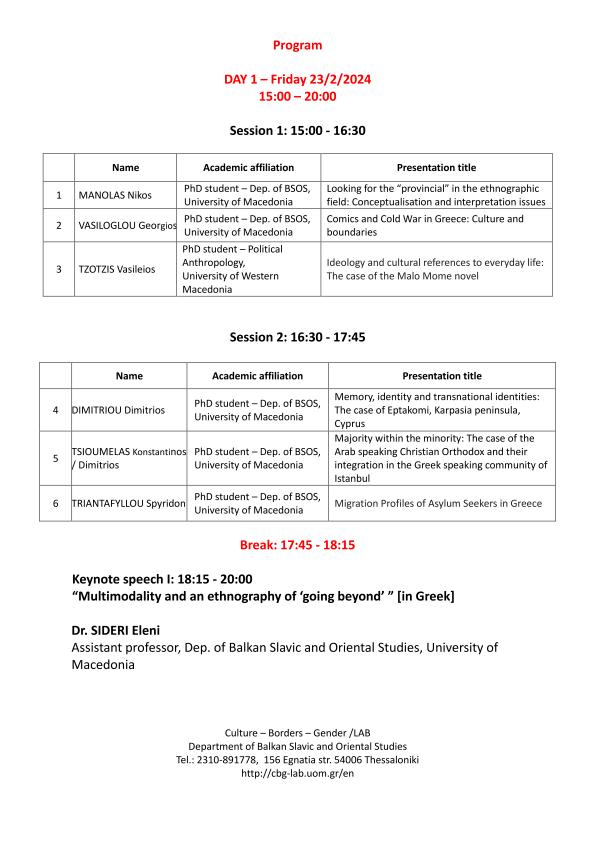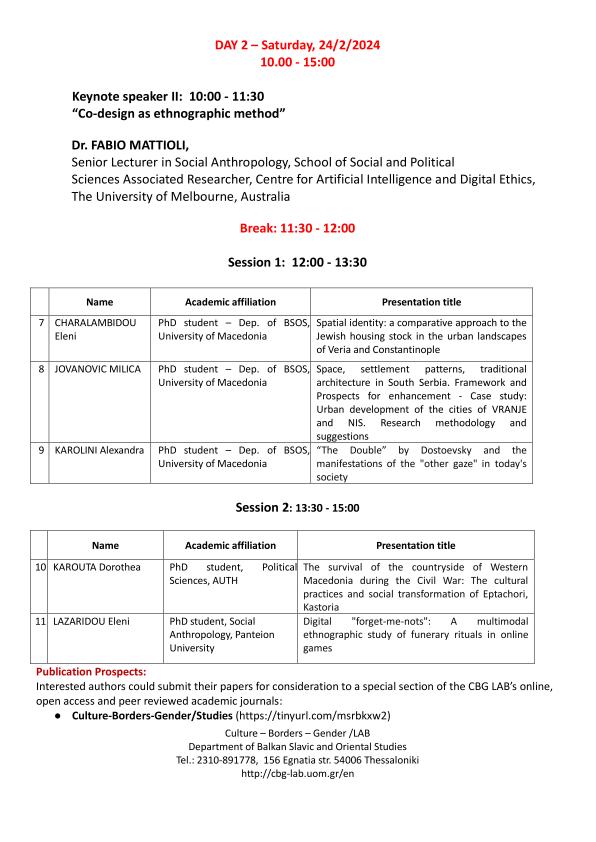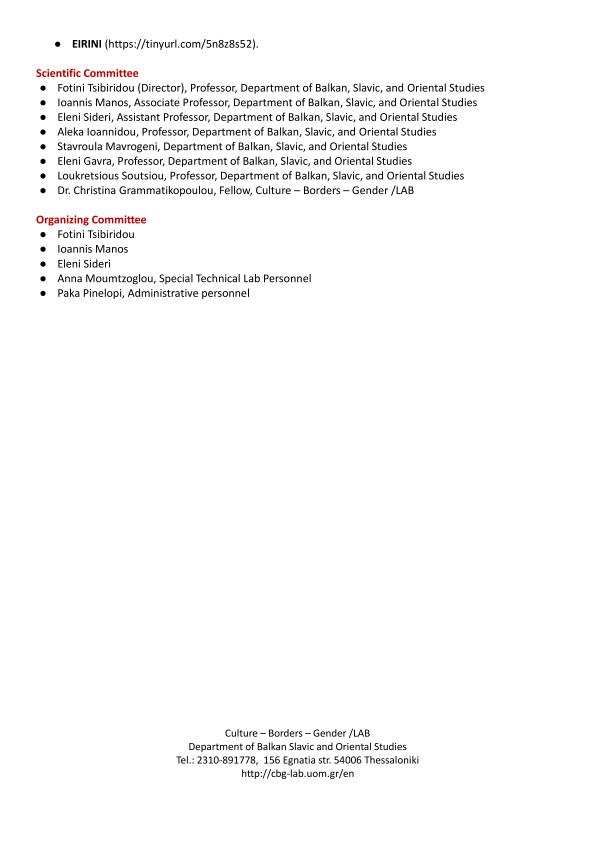ETHNOGRAFEIN
Critical dialogues, epistemological challenges,
field experiences, creative texts
“Borders and boundaries revisited:
Anthropological perspectives and public engagement”
Performance oikade (Aleksandros Plomaritis)
[provided by Dr. Christina Grammatikopoulou]
The online seminars series ETHNOGRAFEIN, since its inception in the spring of 2021, aims to contribute to a critical and interdisciplinary discussion about the theory and practice of ethnography, the epistemology of research, the significance of embodied experience, and also the modes of dissemination of the anthropological knowledge produced to both academic and non-academic audiences. The anthropological endeavour, both as a mode of research practice and a form of political writing, is based on the fundamental epistemological premises of critical evaluation, empathy, reflection, and self-referentiality and highlights the significance of a multifaceted analysis for the understanding of the local to the global.
Organisation and coordination: Fotini Tsibiridou – Ioannis Manos – Eleni Sideri
“Borders and boundaries revisited:
Anthropological perspectives and public engagement”
The 4th period of the ETHNOGRAFEIN online seminars, starting in October 2023 with the title “Borders and boundaries revisited: Anthropological perspectives and public engagement“, sets the study of geopolitical borders as its point of departure to examine the diverse phenomena and processes that abound in the contemporary state border regions and have multilevel consequences for the border populations.
By definition, studying borders and boundaries involves exploring the relationship between the ‘inside’ and the ‘outside’, or the “Self” and the “Other”. However, this is not a study of clear-cut dichotomies but an analysis of the interplay of multiple, multilevel, coexisting, but not necessarily interconnected processes. Boundaries are configured and take shape within a historically determined frame. They are subject to transformations in socio-political and economic contexts and are characterised by institutionally organised asymmetrical power relations. The complex making of borders and boundaries often emerges as a continuous interaction between mobility and enclosure, communication, coexistence, exchange, interaction, sameness and otherness, separation, exclusion, segmentation, connection and disconnection.
The anthropological study of geopolitical borders and their populations by anthropology was systematised in the mid-1990s. It was initially based on two paradigms: the study of the USA-Mexico and European borders. Nowadays, analysing social phenomena and cultural processes concerning borders and boundaries transcends disciplinary boundaries. Novel approaches such as the crοsslocations framework and the current discussion on decolonising methods and epistemologies have expanded the analytical and conceptual significance of the concepts of border and boundary. New methodological and interpretative tools have been created to study politics, trans-border mobility, materiality, transnationalism, topologies and genealogies of migration and refugeeness, border economics, and nation-state policies concerning spatial and cultural diversity, minority rights, and performative culture.
Based on detailed explorations of ethnographic research and anthropological insights, the 4th cycle of the ETHNOGRAFEIN online seminars critically examines the theoretical, epistemological and methodological complexities surrounding the study of geopolitical borders and their imposed dichotomies. Moreover, it discusses anthropology’s potential to bring forth the subtleties of human voices often overshadowed by macro narratives and create an inclusive, comprehensive dialogue in the public sphere that demonstrates the multiplicity of lived experiences.
26 Ferbuary 2024
“Transgressing Realities: Desire and Borders in Southern Balkans”
Rozita Dimova
Social Anthropologist, professor, Prof. Dr. Rozita Dimova, Institute for Advanced Studies (iASK), Kőszeg Center for Interdisciplinary and Advanced Studies, University of Sts. Cyril and Methodius, Skopje
26/02/2024
Rozita Dimova: Transgressing Realities: Desire and Borders in Southern Balkans
In my presentation, I explore the productive role of borders in the Southern Balkans, specifically focusing on hotel-casinos and beauty consumption practices in the Greece-North Macedonia border region. Gamblers who frequent Macedonian casinos use gaming as a means to break free from rigid class constraints imposed by their rural backgrounds in Northern Greece. Financial privilege allows them special treatment, turning gambling into an escape that enables them to reinvent themselves within a new reality. For urban consumers from Thessaloniki, the border provides access to affordable beauty services in Gevgelija, which enables them to reclaim their femininity and middle-class status. This raises questions about how crossing the border influences gender and class perceptions, and intersects with other consumer elements like luxury, comfort, and status, all of which contribute to redefinition and transgression of their “old” selves.
Rozita Dimova, PhD (Stanford, 2004) is a Social Anthropologist with a distinguished record of achievements, including the prestigious Robert Texture Award for Outstanding Creativity in Anthropology. Rozita has held research positions at prominent institutions, including the Max Planck Institute for Social Anthropology in Halle (2003-2006), Free and Humboldt Universities in Berlin (2007-2015), and served as an Associate Professor in Southeast European Studies at Ghent University in Belgium (2013-2020). A Founding and Permanent Board Member at the Center for Advanced and Interdisciplinary Research at the University Sts. Cyril and Methodius in Skopje, North Macedonia, Rozita is currently also a Research Fellow at the Institute for Advanced Studies in Kőszeg, Hungary. Her research portfolio includes materiality, consumerism and aesthetics, ethno-nationalism, borders and migration studies. A prolific author, Rozita is the author of the monographs, Ethno-Baroque: Materiality, Aesthetics, and Conflict in Modern-day Macedonia (Berghahn, 2013) and Border Porosities: Movements of People, Objects, and Ideas in the Southern Balkans (Manchester University Press, 2021).
Only those participants who wish to receive certificates of attendance register in the following form: https://forms.gle/6vVWdrM3HKLSLfAF9
The registration form will receive answers one week before the seminar.
The seminars are held on Mondays from 16:00-18:00
————————————————————————–
Seminar Platform: ZOOM
Link https://zoom.us/j/8364531775?pwd=OVg3YVZlbmVCYWs3S0JYcEFGYlV1QT09
Meeting ID: 836 453 1775 Passcode: KB2JKa







